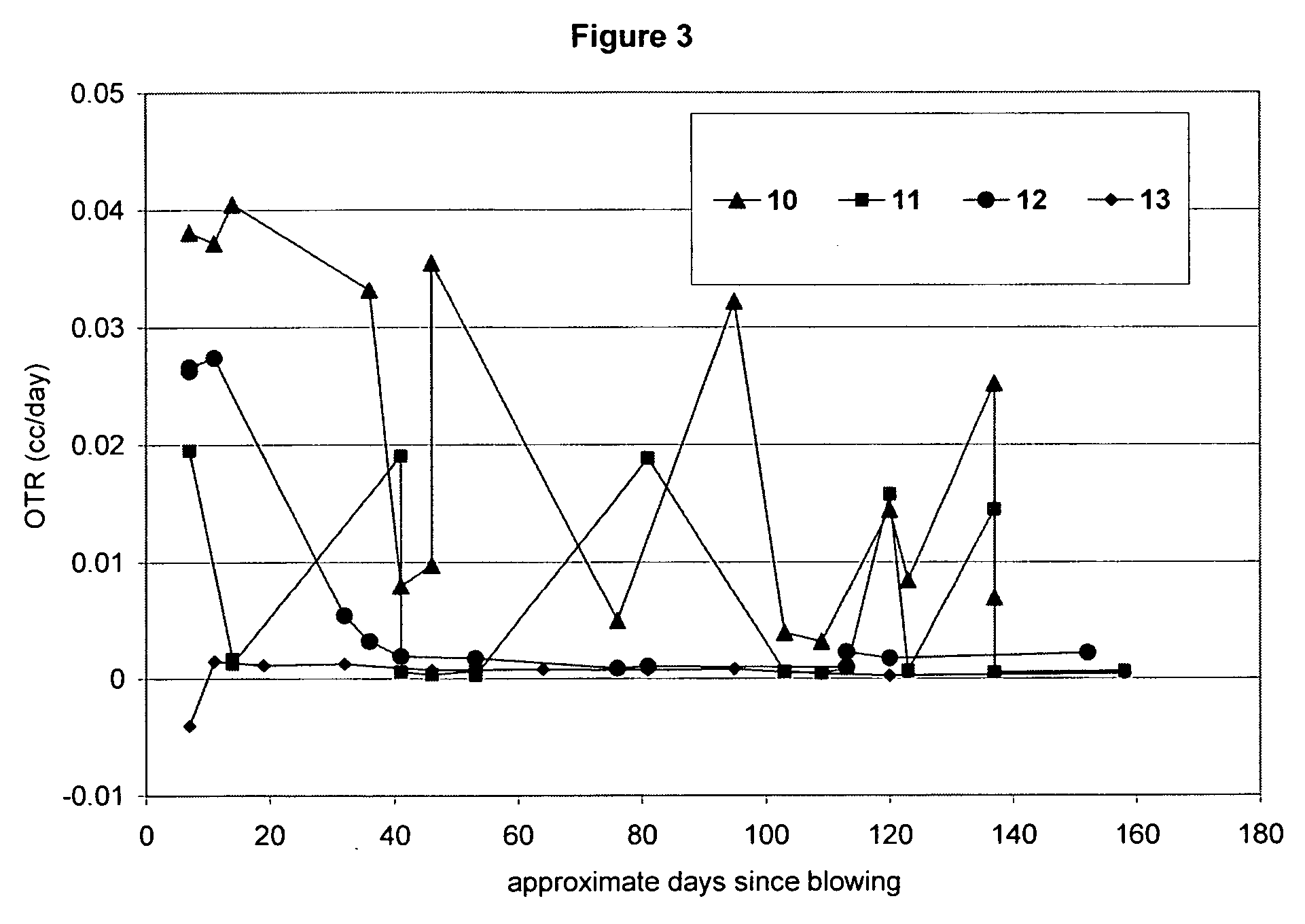Polyester based cobalt concentrates for oxygen scavenging compositions
a technology of cobalt concentrate and polyester, which is applied in the direction of synthetic resin layered products, and non-conductive materials with dispersed conductive materials, etc. it can solve the problems of long induction period, short life span (capacities), and increase the cost of the final package, so as to effectively scavenge oxygen and reduce the cost of final packaging. , the effect of short residence time and greater flexibility
- Summary
- Abstract
- Description
- Claims
- Application Information
AI Technical Summary
Benefits of technology
Problems solved by technology
Method used
Image
Examples
example 1
[0116] This example demonstrates that it is preferred to let down the concentrate free of added polyamide polymer into an injection molding machine. 25 gram preforms and 20 oz straightwall bottles were produced from the following (nominal) oxygen scavenging compositions set forth in Table 1.
CobaltMethod of additionPA-A contentamtto Melt Processing ZoneSample #(wt %)(ppm)PA-ACobalt100NANA230Neat PA-A pelletsNA33150PA-A / Cobalt Concentrate43150Neat PA-A pelletsSolidConcentrate 15370Neat PA-A pelletsSolidConcentrate 162100PA-A / Cobalt Concentrate
[0117] The bulk polyester polymer pellets fed to the injection molding machine is Polyester Polymer Resin 1. The concentrate used in the preparation of samples 3 and 6 is a polyester based concentrate of cobalt neodecanoate (TEN-CEM 22.5%) and PA-A in Polyester Polymer Resin 3. The concentrate can be made by mixing the cobalt salt and PA-A into Resin 3 using a 30 mm Werner & Pfleiderer twin screw extruder. The approximate level of cobalt in the...
example 2
[0122] This example demonstrates that concentrates are effective at catalyzing oxygen scavenging activity over a range of compositions.
[0123] 25 gram preforms and 20 oz straightwall bottles were produced from the following (nominal) oxygen scavenging compositions set forth in Table 3.
TABLE 3PA targetCo amountSample #Bulk PETamt (wt %)PA Type(ppm)7Resin 21PA-A1008Resin 23PA-A1009Resin 25PA-A10010Resin 23PA-B3011Resin 23PA-B15012Resin 25PA-B3013Resin 25PA-B15014Resin 13PA-A100
[0124] In Samples 7-14, the source of cobalt was Solid Concentrate 1. The amount of cobalt added to the melt processing zone in the injection molding machine is varied to yield the stated amounts of cobalt in the article. The stream of bulk polyester polymer particles is as set forth in the second column of Table 3. The PA was fed to the injection molding machine as a separate stream of polyamide pellets.
[0125] The preforms and bottles are prepared by the following method:
[0126] Both types of PA were dried a...
example 3
[0129] This example demonstrates that solid concentrates are an effective means for adding oxidation catalysts to a range of bulk polyester polymer compositions. 25 gram preforms and 20 oz straightwall bottles were prepared from the following compositions using Solid Concentrate 1.
TABLE 5PA-A target amtMeasured CoSample #Bulk PET(wt %)amount (ppm)*15Resin 1310116Resin 539517Resin 638618Resin 7393
*by XRF.
[0130] In Samples 15-18, the source of cobalt was Solid Concentrate 1. The amount of Solid Concentrate 1 added to the melt processing zone in the injection molding machine is varied to yield the amounts of cobalt set forth in Table 5. The stream of bulk polyester polymer particles is as set forth in the second column of Table 5. The PA-A was fed to the injection molding machine as a separate stream of polyamide pellets.
[0131] The preforms and bottles are prepared by the following method:
[0132] The PA-A was dried at 150 F while the bulk PET resin was dried in a separate system at...
PUM
| Property | Measurement | Unit |
|---|---|---|
| Fraction | aaaaa | aaaaa |
| Fraction | aaaaa | aaaaa |
| Fraction | aaaaa | aaaaa |
Abstract
Description
Claims
Application Information
 Login to View More
Login to View More - R&D Engineer
- R&D Manager
- IP Professional
- Industry Leading Data Capabilities
- Powerful AI technology
- Patent DNA Extraction
Browse by: Latest US Patents, China's latest patents, Technical Efficacy Thesaurus, Application Domain, Technology Topic, Popular Technical Reports.
© 2024 PatSnap. All rights reserved.Legal|Privacy policy|Modern Slavery Act Transparency Statement|Sitemap|About US| Contact US: help@patsnap.com










